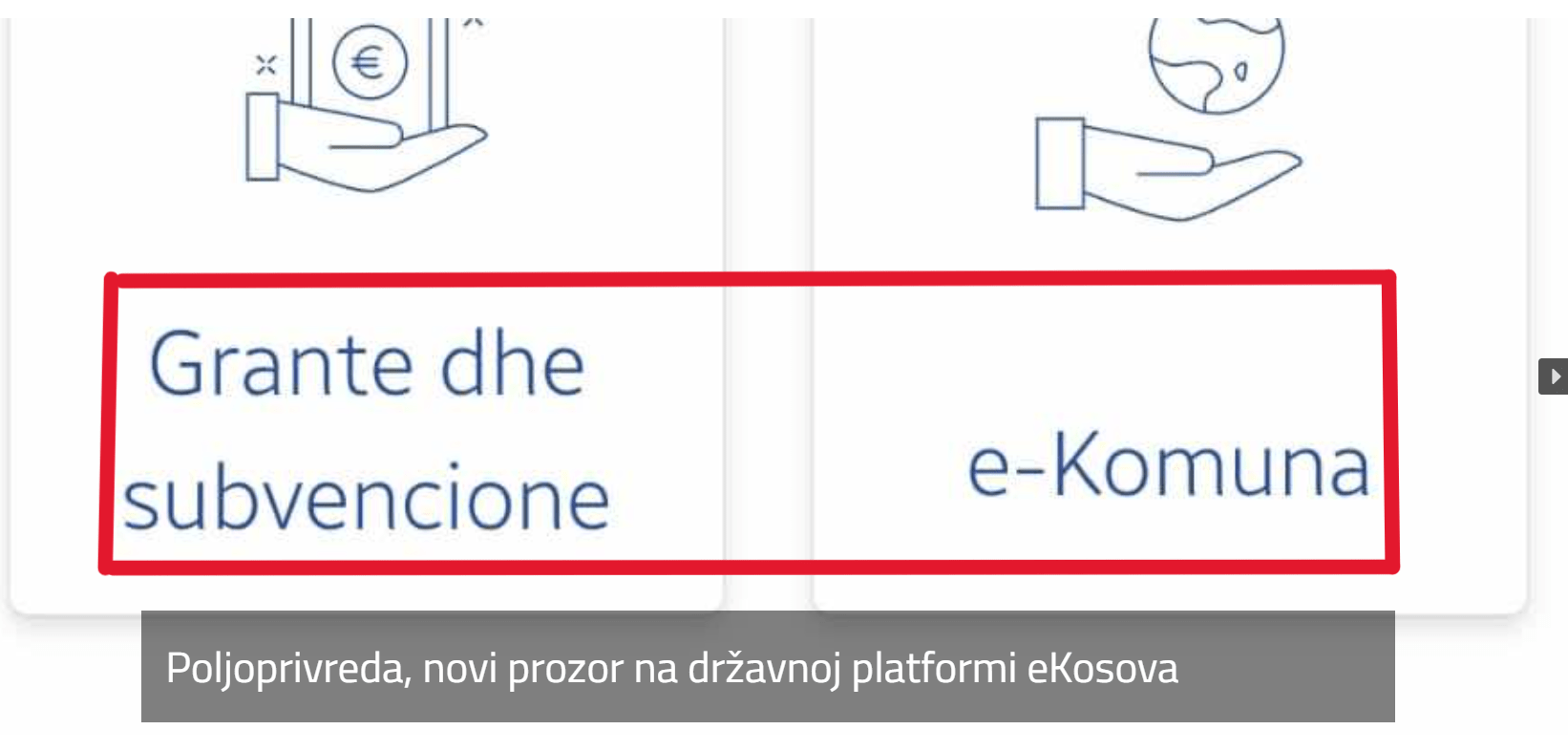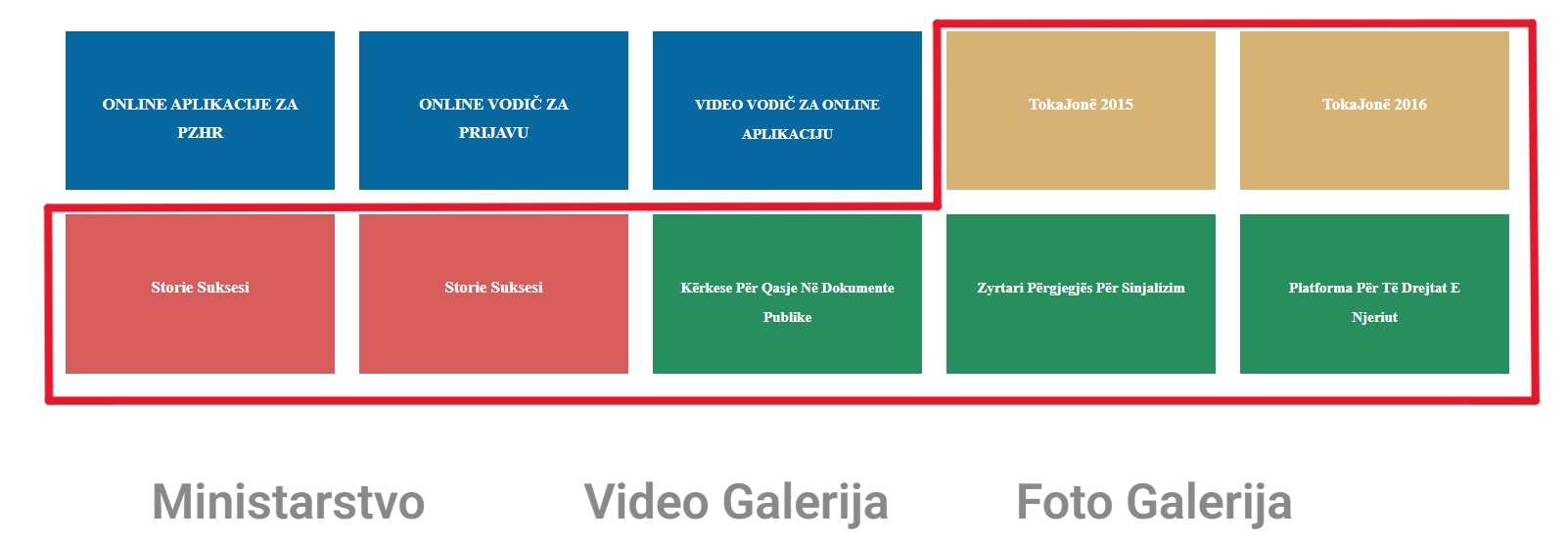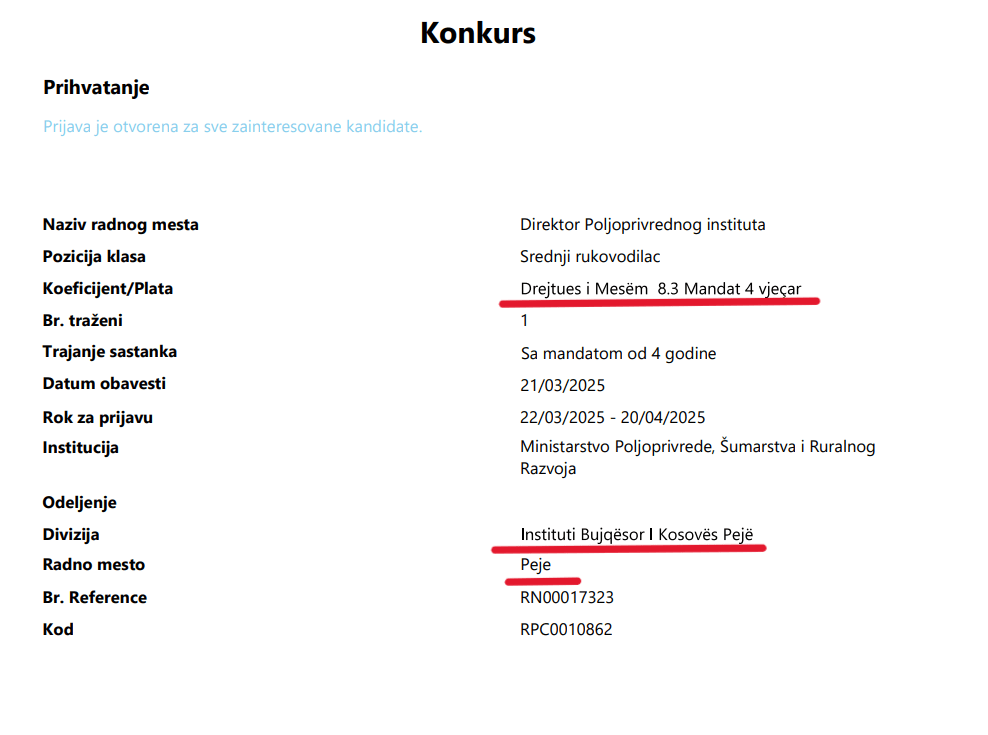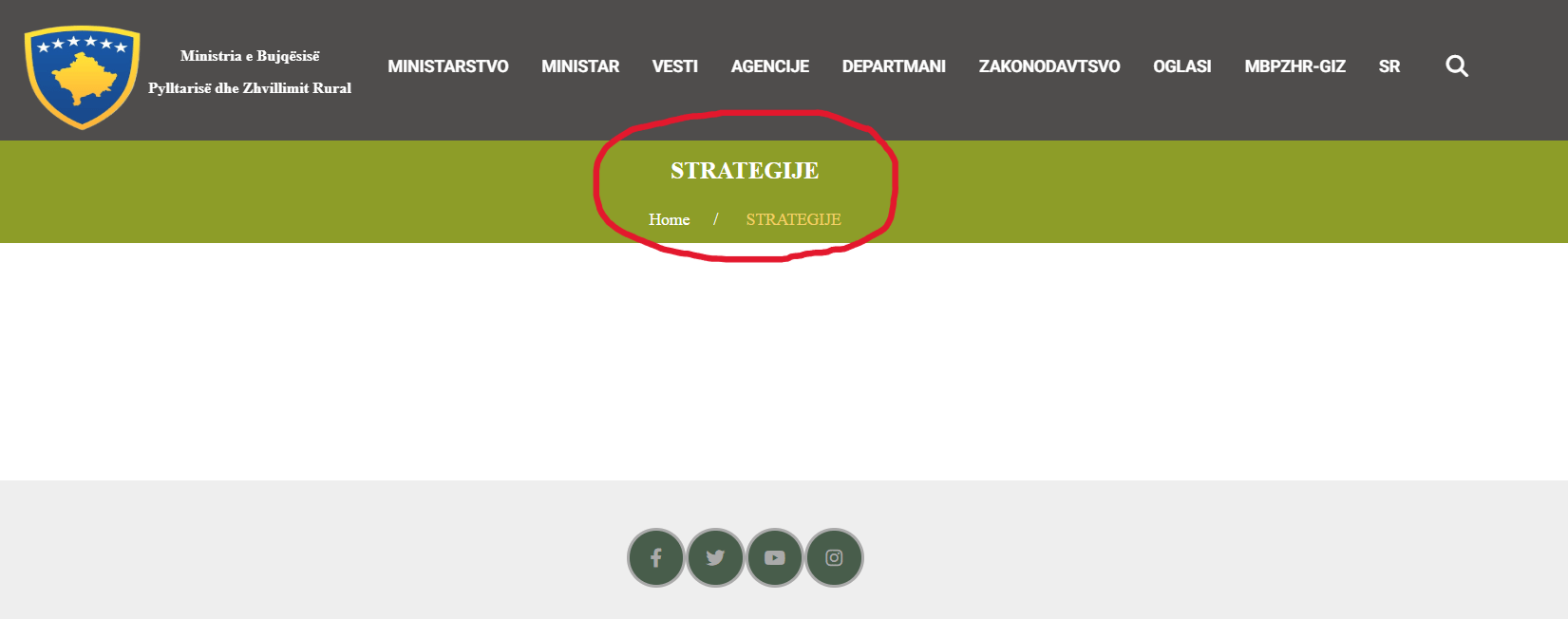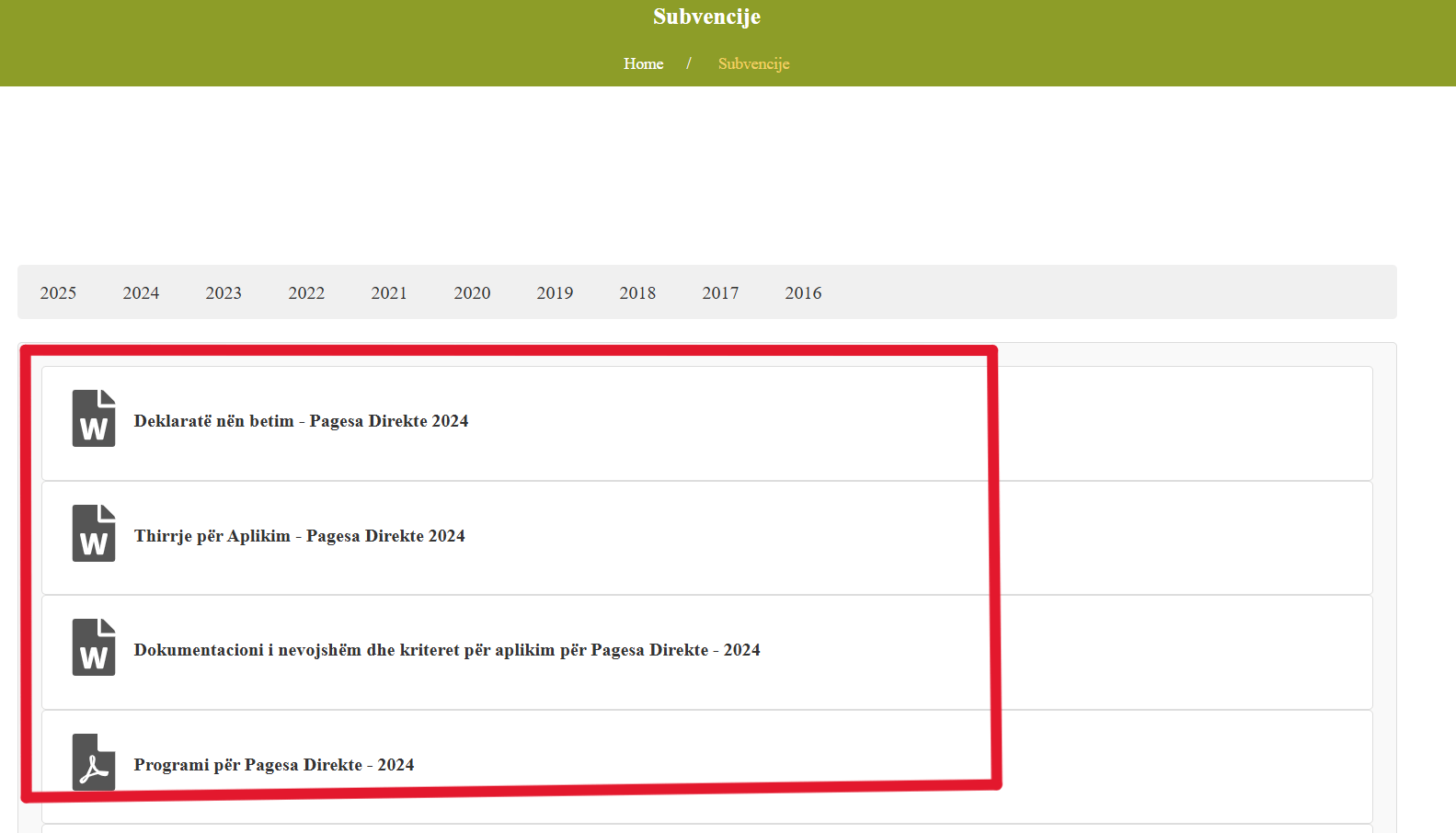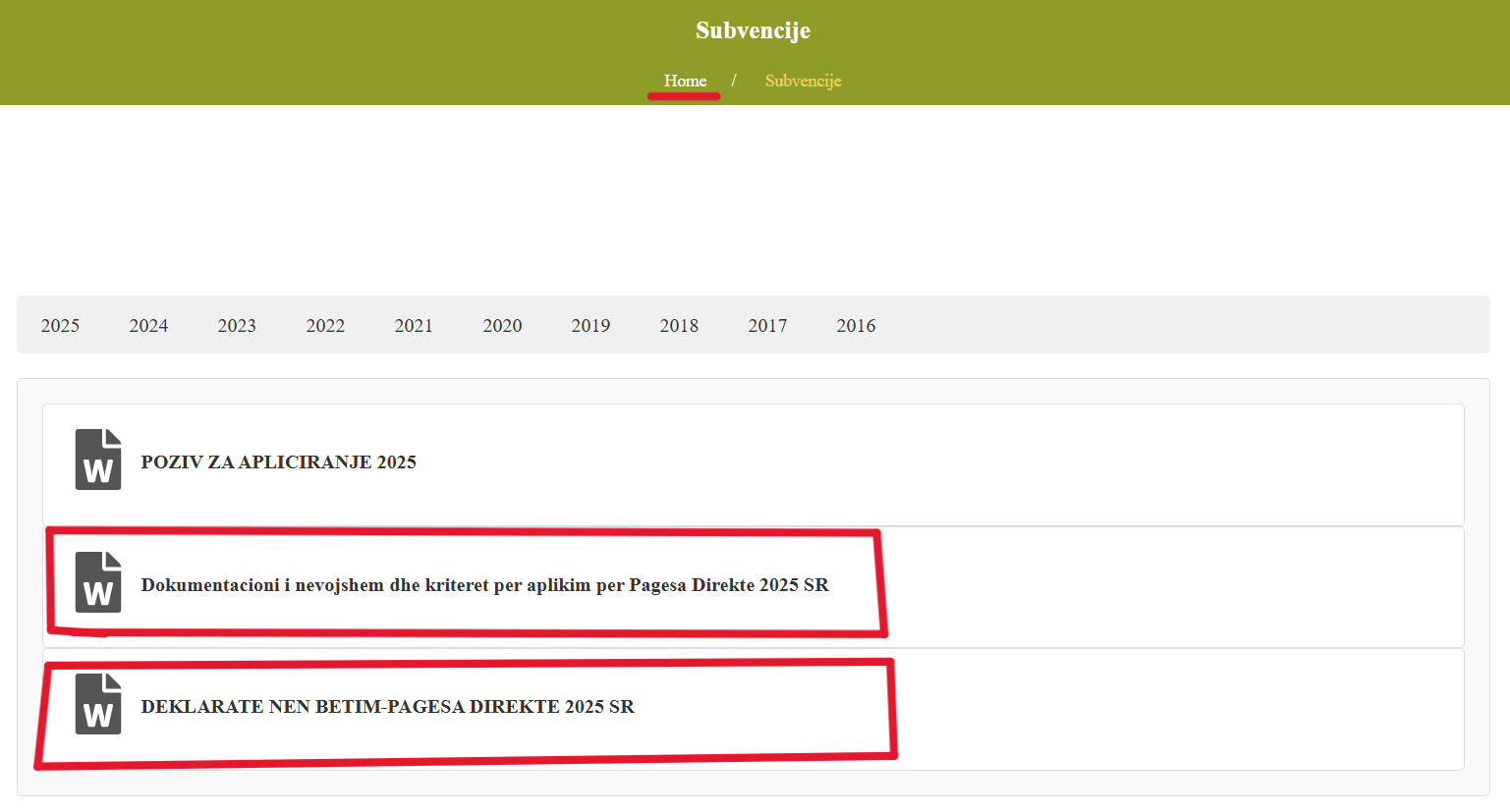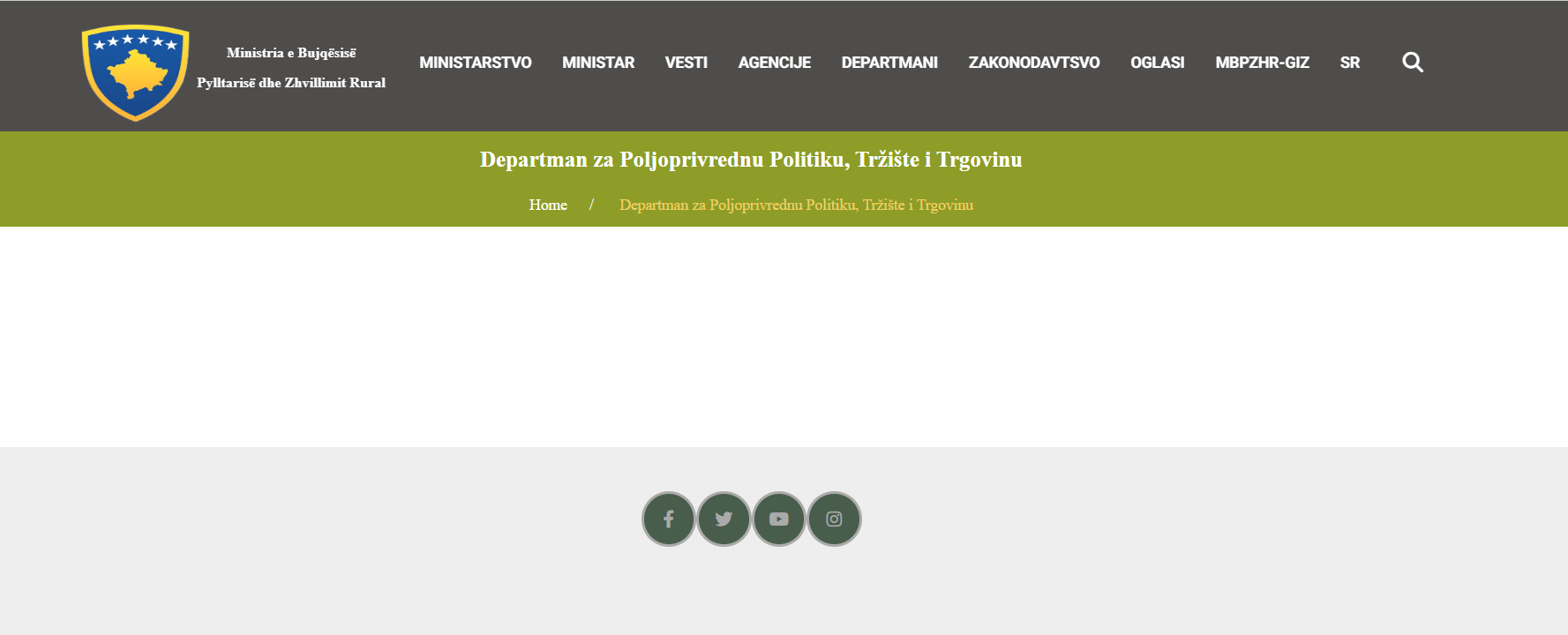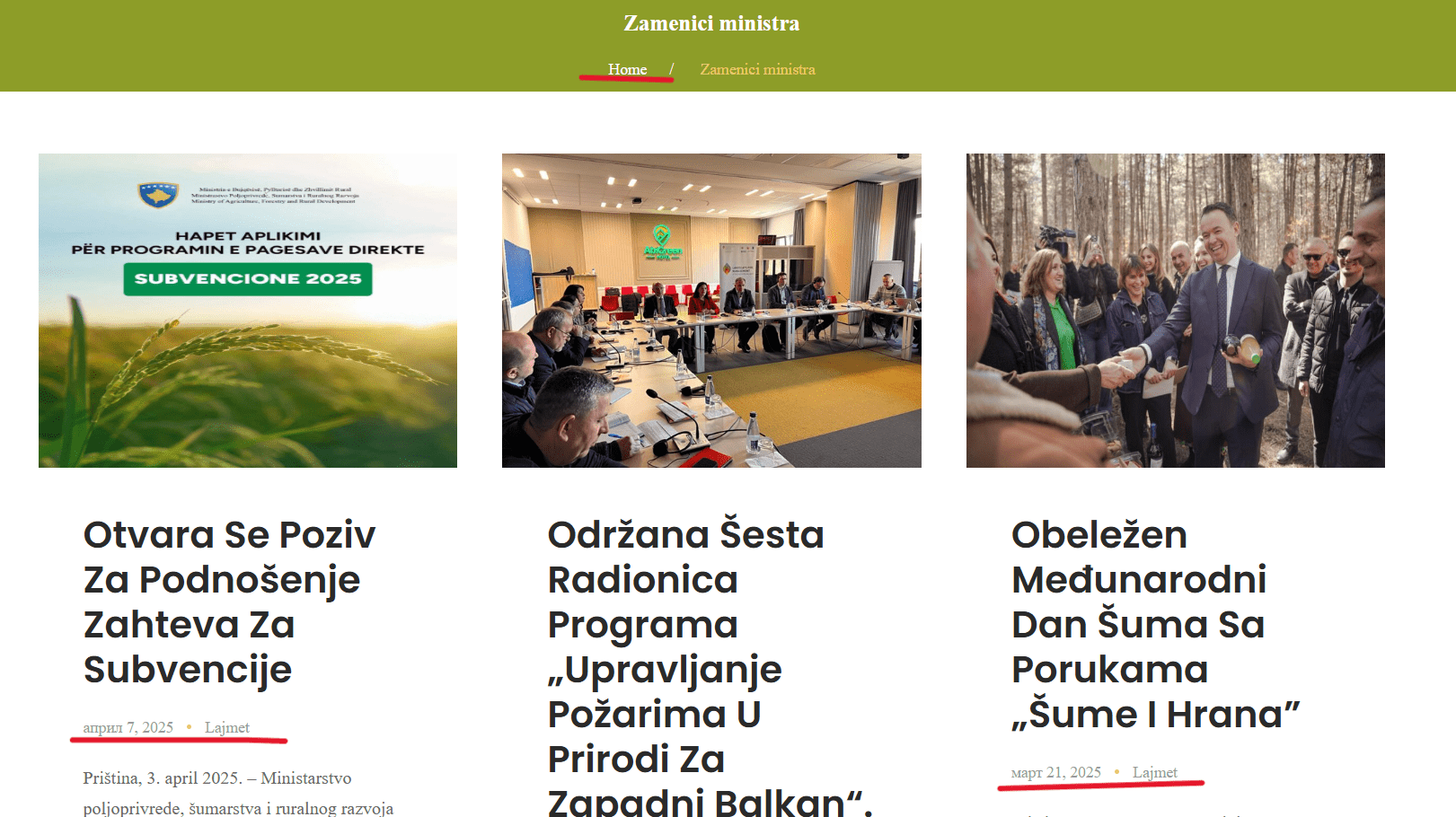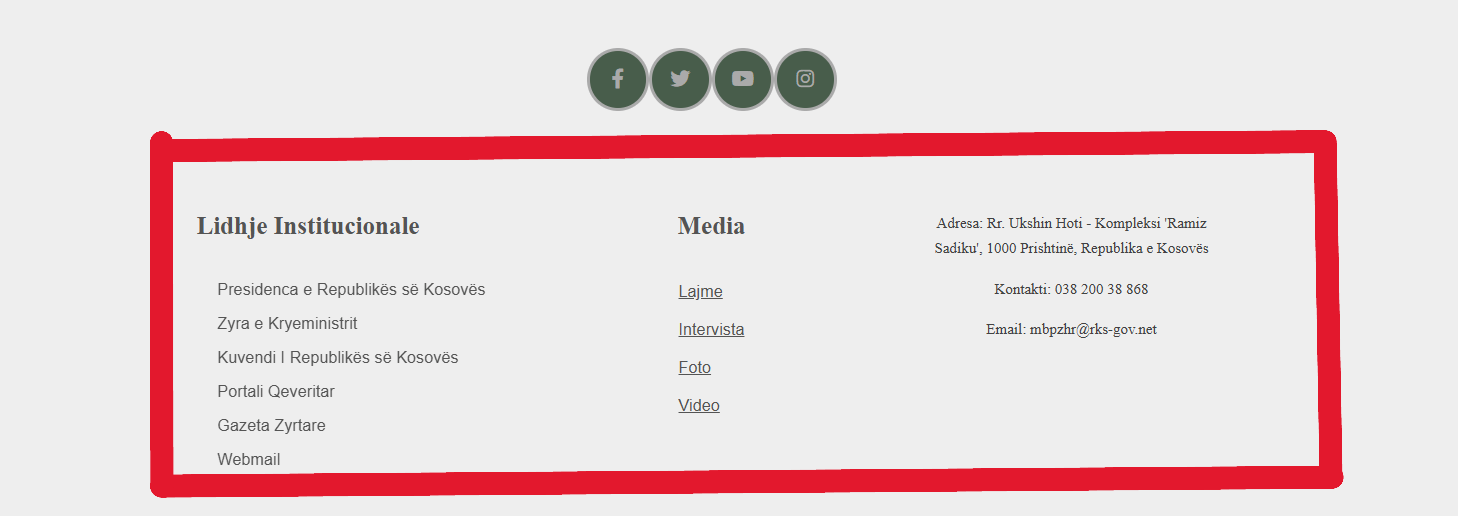Key documents, administrative guidelines, and information on specific benefits are almost entirely missing — this is the conclusion after analyzing the official website of the Ministry of Agriculture, Forestry and Rural Development. In cases where translations do exist, they are often incomplete, outdated, or the documents are unavailable for download. This issue is not limited to written documentation; video materials and other forms of communication are predominantly in Albanian, while information in Serbian is reduced to a minimum.
The issue of the systematic violation of the Law on the Use of Languages in Kosovo has been raised for years, yet it persists despite the legal framework[1] that guarantees the equal use of the Serbian and Albanian languages. In this context, non-majority communities — in this case, those who communicate in Serbian — are left without access to key information. Moreover, this issue was also noted in the European Commission’s 2023 Report on Kosovo[2] which highlights the problem in several instances.
Therefore, NGO Aktiv, Radio Kim, the New Social Initiative (NSI), and Radio Goraždevac are continuing their public advocacy campaign aimed at encouraging institutions to address this long-standing issue. This week, the focus is on the Ministry of Agriculture, Forestry and Rural Development. After reviewing the Ministry’s official website and social media channels, we found that it follows almost the same harmful practice we previously warned about when analyzing earlier cases: the Central Election Commission (CEC), the Ministry of Internal Affairs (MoIA), the Police Inspectorate of Kosovo (PIK), and the Kosovo Police (KP).
The lack of information, administrative guidelines, and other key documents in the Serbian language directly affects Kosovo citizens who use it, limiting their ability to participate equally in the programs and benefits offered by the Ministry of Agriculture, Forestry and Rural Development. Given that the law clearly mandates equal access to information in both official languages, such practice not only constitutes a violation of legal obligations but also leads to the discrimination of a particular community in accessing subsidies, grants, and other incentives provided by this Ministry in cooperation with the Agricultural Development Agency — which will be the focus of our analysis next week.
The majority of media outlets reporting in Serbian south of the Ibar River have never been contacted by the Ministry of Agriculture, Forestry and Rural Development in any form (press release, notification, or invitation to a press conference). Sparse information related to the work of this highly important ministry — especially considering Kosovo’s strong economic reliance on agriculture — was sporadically shared with journalists over a short period, and only from the Office of the Prime Minister, never from the ministry itself. The same issue has been observed in communication with media from northern Kosovo — according to journalists, the ministry does not maintain regular communication with them either. Only one interview has been recorded in which Minister Faton Peci, last year, spoke to a news portal from northern Kosovo that reports in Serbian.
What Did We Discover on the Website of the Ministry of Agriculture, Forestry and Rural Development?
Website[3]: The name of the Ministry, in the Serbian-language section of the website, appears exclusively in Albanian. The same applies to the contact information found at the bottom of the page. Additionally, some of the categories in this section are presented in English. There is also a noticeable misuse of capital letters and diacritical marks typical of the Albanian language. The arrangement of official languages in the dropdown menu is inadequate, as Serbian is listed third — after English, which is not an official language in Kosovo. The translation of news articles into Serbian is often delayed, and some are never translated at all.
Reports and Publications: Although the website includes a section intended for the Serbian language, all report and publication titles are displayed exclusively in Albanian[4], while some content is not accessible at all[5].
Vacancies: In this category, there is a noticeable disparity in the number of documents available in Serbian and Albanian. While more than 150 documents are provided in Albanian[6] only eight are available in Serbian, and three of those are titled in Albanian[7].
Mandate of the Ministry: The content under the “History and Mandate” category in the Serbian-language section of the website is nonexistent[8] aside from the title, there is no accompanying text. It should be noted that the same situation applies to the Albanian-language[9] section of the website.
Secretary General: Information about the Ministry’s Secretary General in the Serbian-language version of the website is presented in a significantly shortened form[10], without a photo and including only three basic pieces of information: full name, position, and email address. In contrast, the Albanian-language version features a detailed biography[11] with a wide range of information on the official’s qualifications, education, and professional experience.
Departments: When it comes to the departments and sectors of this ministry, it is noticeable that one category — Public Relations — is missing from the Serbian section of the website. Additionally, in the Serbian version[12] the category dedicated to the Human Rights and Anti-Discrimination Unit includes only the contact details of the person employees can reach out to. In contrast, the Albanian version[13] of the site provides detailed information on the mandate, core responsibilities, and legal framework of this sector.
Organizational Chart: Although the organizational chart is displayed in Serbian in the Serbian-language version of the website, its resolution is low, making it difficult to read. In contrast, the Albanian version[14] of the site presents the chart clearly and in an appropriate resolution, while users of the Serbian version must zoom in multiple times to view the information properly[15].
Information on Deputy Ministers: In the Serbian version of the website, information about the deputy ministers is not available. Clicking on this category redirects users to content[16] about workshops and the celebration of the International Day of Forests, instead of the previously indicated relevant information. In contrast, the Albanian version[17] of the website provides detailed information, including photographs, biographies, professional experience, and data on assistants and political advisors. In fact, the entire category is completely inaccessible in the Serbian-language section.
Agencies[18]: One of the most striking examples of language rights violations is the “Agencies” category. In the Serbian-language section of the website, there is no information whatsoever about the Forestry Agency (Kosovo Forestry Agency) or the Agricultural Development Agency, nor are there any details on direct payments or rural development projects.
Departments: The same issue applies to the “Departments” category. In addition to being translated as “Departmani,” this section in the Serbian-language version[19] of the site offers only 7 categories, whereas the Albanian-language section[20] contains extensive and detailed information divided into as many as 36 categories.
Subsidies: If you wish to obtain information about the subsidies offered by the Ministry of Agriculture, Forestry and Rural Development in Serbian, you will encounter a language barrier, as almost all document titles are available exclusively in Albanian[21]. Moreover, even if you attempt to download or open them, it will not be possible, as the documents are either inaccessible[22] or do not exist on the website at all.
Legislation: In this category as well, the situation is linguistically asymmetrical. First and foremost, compared to the Albanian version, two categories are missing in the Serbian-language section. Additionally, there is no information available on laws[23], bylaws (with only one document provided)[24] or strategies[25], despite these being listed as categories. Furthermore, unlike the Albanian-language section, the Serbian version lacks the categories “Administrative Instructions” and “Decisions”.
Tenders[26]: Of the nine documents related to tenders in the Serbian-language section of the website, none are in Serbian — four are in Albanian and five are in English. Moreover, half of the documents cannot be downloaded. Additionally, the “Contracts” category, which exists in the Albanian-language section[27], is entirely missing from the Serbian version.
Online Grant Application Guides: The application[28] and online campaign[29] elated to guides for applying for certain grants, featured on the homepage of the Serbian-language section of the website, are available exclusively in Albanian.
Social networks
Facebook[30]: The name of the institution, as well as the introductory section of the website, are available exclusively in Albanian. The description[31] including its history and mandate is also not translated into Serbian. When it comes to activities and published information[32] the availability in Serbian varies depending on the topic. Posts related[33] to the minister’s and officials’ activities, meetings, or weather alerts[34] that may affect agriculture are available only in Albanian. Serbian translations are provided solely for information regarding subsidies[35] and grants awarded by the ministry. Almost all video content[36] materijal, including promotional campaigns[37], visits to agricultural holdings[38], and other ministry activities, is published in Albanian. The only exceptions are a few rare[39] posts related to the north of Kosovo.
X (Ex-Twitter): In the case of this social media platform, our search revealed three separate accounts. The first[40] dates back to 2012, while the second[41] was created in 2015. However, the third account, which is actually linked on the ministry’s official website, does not exist[42]. In general, the language situation is identical across both existing accounts – there are no traces of Serbian language use, as all posts and activities are exclusively in Albanian.
YouTube[43]: The situation on the Ministry’s YouTube channel is somewhat better compared to other social media platforms previously analyzed, but significant issues remain regarding the availability of content in Serbian. Many published video materials lack Serbian translation entirely, and often do not include even a basic description indicating the video’s topic or key information. There is also a clear imbalance in the number of videos available in Albanian compared to Serbian. Informational campaigns, field reports, footage of official visits, and tours of agricultural holdings are mostly available only in Albanian, while Serbian-language content is extremely rare.
Why is this important?
As we highlighted in our previous analyses, this continuation of our campaign further confirms that the systematic neglect of the Serbian language within Kosovo’s institutions is a serious issue. Such practices prevent equal access to information for non-majority communities and represent a direct violation of the Law on the Use of Languages[44].
This law clearly stipulates that Albanian and Serbian are equal official languages in Kosovo. However, the long-standing practice of ignoring this issue and remaining silent in the face of ongoing violations of language rights deprives Serbian citizens and other non-majority communities, who rely on information available in Serbian, of their constitutionally and legally guaranteed right to equal access to information of public importance.
That is why it is crucial to replace the current practice of using unqualified translators or Google Translate with professional, qualified translators who can ensure accurate and unambiguous translations of content into Serbian. By establishing a functional translation system, uninterrupted access to information of public importance will be secured. More importantly, institutions will demonstrate their practical commitment to fully respecting not only language rights but also fundamental human rights — including the rights of non-majority communities, as guaranteed by the Universal Declaration of Human Rights.[45].
While non-governmental organizations, operating with limited resources, regularly ensure the trilingual presentation of their activities, the Ministry of Agriculture, Forestry and Rural Development, which had a budget of €35,968,168[46] in 2022, certainly had sufficient funds to provide adequate translation into Serbian.
We therefore call on the Ministry of Agriculture, Forestry and Rural Development to immediately begin the process of aligning the language versions of the information published on its website and social media platforms, and to ensure equal access to information in both official languages.
Once again, we urge the Office of the Prime Minister to refrain from political rhetoric without tangible results, to abandon the practice of merely declarative commitments to the rights of non-majority communities, and to instruct institutions to harmonize language standards at all legally prescribed levels.
At the same time, we call on the Office of the Language Commissioner to begin enforcing the legal provisions within its mandate. This includes building an institutional environment that respects constitutional and legal obligations, as well as protecting, promoting, preserving, and implementing the language rights of all Kosovo citizens.
We once again encourage all citizens to actively participate in this process and report any observed language-related irregularities to the competent institutions, such as the Office of the Language Commissioner (zkgj.kpj@gmail.com) and the Ombudsperson Institution (info.oik@oik-rks.org). We also invite citizens who encounter specific language anomalies to contact NGO Aktiv (office@ngoaktiv.org) and join us in urging the responsible institutions to respect the legally established standards.
[1] https://kryeministri.rks-gov.net/wp-content/uploads/2022/05/ZAKON_BR._02_L-37_O_UPOTREBI_JEZIKA1346.pdf
[2] https://enlargement.ec.europa.eu/document/download/c790738e-4cf6-4a43-a8a9-43c1b6f01e10_en?filename=Kosovo%20Report%202024.pdf
[3] https://mbpzhr.rks-gov.net/home-page-sr/
[4] https://mbpzhr.rks-gov.net/wp-content/uploads/2024/12/Bujqesia_e_Kosoves_ne_Numra_2023.pdf
[5] https://mbpzhr.rks-gov.net/wp-content/uploads/2024/12/.pdf
[6] https://mbpzhr.rks-gov.net/konkurse/#top
[7] https://mbpzhr.rks-gov.net/konkursi/#top
[8] https://mbpzhr.rks-gov.net/istorija-i-mandat/
[9] https://mbpzhr.rks-gov.net/historiku-dhe-mandati/
[10] https://mbpzhr.rks-gov.net/stalni-sekretar/
[11] https://mbpzhr.rks-gov.net/sekretari-i-pergjithshem/
[12] https://mbpzhr.rks-gov.net/jedinica-za-ljudska-prava/
[13] https://mbpzhr.rks-gov.net/njesia-per-te-drejtat-e-njeriut-dhe-mbrojtje-nga-diskriminimi/
[14] https://mbpzhr.rks-gov.net/organogrami/
[15] https://mbpzhr.rks-gov.net/sistematizacija/
[16] https://mbpzhr.rks-gov.net/zamenici-ministra/
[17] https://mbpzhr.rks-gov.net/zevendesministrat/
[18] https://mbpzhr.rks-gov.net/agencija-sumarstva/
[19] https://mbpzhr.rks-gov.net/departman-za-politiku-ruralnog-razvoja-menadzerskog-autoriteta/
[20] https://mbpzhr.rks-gov.net/departamenti-i-politikave-te-zhvillimit-rural-autoriteti-menaxhues/
[21] https://mbpzhr.rks-gov.net/subvencije/#top
[22] http://mbpzhrwp.techvision-ks.com/wp-content/uploads/2024/04/PROGRAMI_PER_PAGESA_DIREKTE__2024-1.pdf
[23] https://mbpzhr.rks-gov.net/zakoni/
[24] https://mbpzhr.rks-gov.net/pravilnici/
[25] https://mbpzhr.rks-gov.net/strategije/
[26] https://mbpzhr.rks-gov.net/tenderi/
[27] https://mbpzhr.rks-gov.net/kontratat/
[28] https://azhb-aplikimet.rks-gov.net/Identity/Authenticate?ReturnUrl=%2f
[29] https://www.azhb-rks.net/repository/docs/UserManual_Al_pzhr.pdf
[30] https://www.facebook.com/mbpzhr
[31] https://www.facebook.com/mbpzhr/about_details
[32] https://www.facebook.com/share/p/1FbmqMN8Vz/
[33] https://www.facebook.com/share/p/1BmJMzrXup/
[34] https://www.facebook.com/share/p/1FbmqMN8Vz/
[35] https://www.facebook.com/share/p/1AYKpr973J/
[36] https://www.facebook.com/mbpzhr/videos
[37] https://www.facebook.com/mbpzhr/videos/1080181120739568
[38] https://www.facebook.com/mbpzhr/videos/814324054123443
[39] https://www.facebook.com/mbpzhr/videos/891465192853908
[40] https://x.com/mbpzhr
[41] https://x.com/mbpzhr_Kosova
[42] https://x.com/MBPZHRKosovo
[43] https://www.youtube.com/@mbpzhrkosovo975/videos
[44] https://kryeministri.rks-gov.net/wp-content/uploads/2022/05/ZAKON_BR._02_L-37_O_UPOTREBI_JEZIKA1346.pdf
[45] https://www.ohchr.org/en/human-rights/universal-declaration/translations/serbian-latin-srpski
[46] https://mbpzhr.rks-gov.net/wp-content/uploads/2024/12/Bujqesia_e_Kosoves_ne_Numra_2023.pdf



